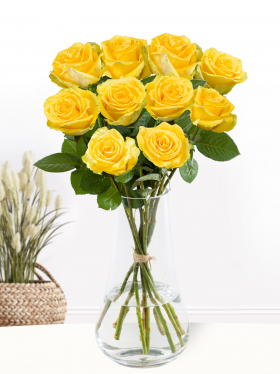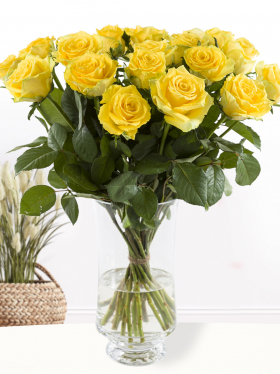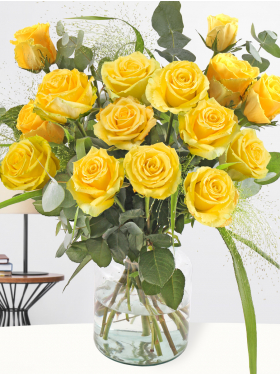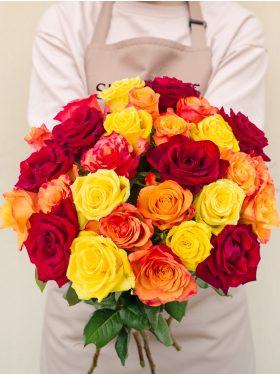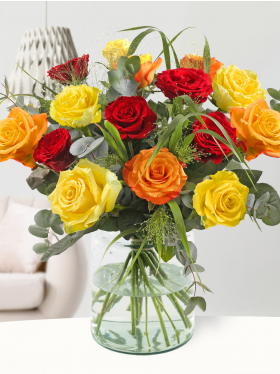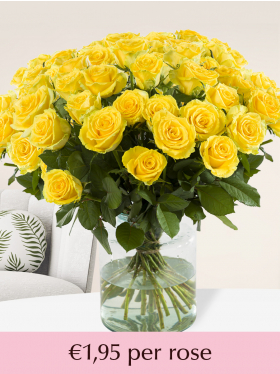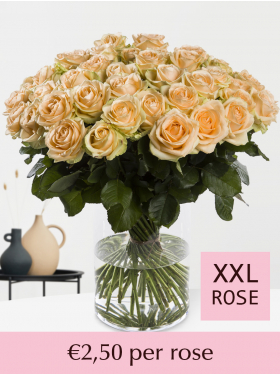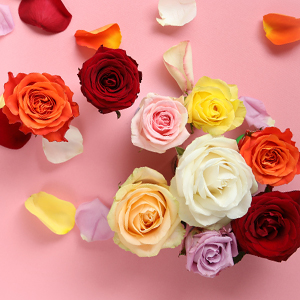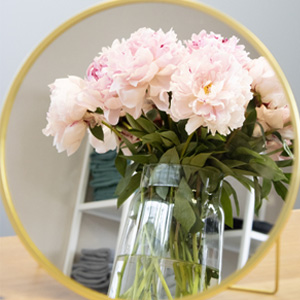Everyone knows the meaning of the red rose, namely love. But did you know that all colours of roses have their own meaning? Here we tell you everything about the meaning of the yellow rose. Yellow roses have different symbolism depending on the culture. The warm and sunny colour of this rose evokes associations that differ depending on the culture and the context in which you give the yellow roses.
Western Europe and North America: yellow roses symbolise friendship and joy
In many Western countries, including the Netherlands, Belgium, Germany and the United States, yellow roses symbolise friendship, pleasure and joy. You give a yellow rose to cheer someone up, to celebrate a new friendship or to show your gratitude and appreciation. In symbolism, the yellow rose is therefore the opposite of the red rose; it does not represent love between lovers, but rather a friendly bond!
In the Victorian era, yellow roses had a completely different meaning. At that time, yellow roses were associated with jealousy and betrayal, but fortunately, that negative connotation has completely disappeared today!
Occasions for yellow roses in Western cultures
- Birthdays: Give a bouquet of yellow roses to a good friend on their birthday.
- Secretary's Day: Due to the platonic meaning of the yellow rose, it is very suitable to give to colleagues and employees!
- As a thank you: Thank your neighbour for watering your plants or looking after your cat or fish while you were on holiday.
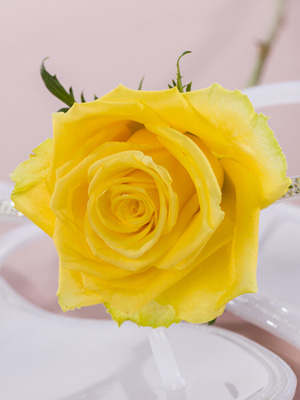

The most beautiful yellow roses:
The symbolism of yellow roses in Asia
In Asia, the symbolism of yellow roses differs from that in Western countries. The symbolism of the colour even varies from country to country. Something to keep in mind when giving or receiving yellow roses!
Yellow roses in Japan
In Japan, yellow flowers – including roses – are associated with harmony, prosperity and inner peace. The colour yellow often symbolises courage and modesty there. Giving yellow roses in Japan is therefore a gesture of goodwill. So feel free to send someone from Japan a bouquet of yellow roses!
The yellow rose in China
In traditional Chinese culture, the colour yellow has a very deep symbolism. For centuries, yellow was the colour of the emperor. The colour was therefore seen as sacred and imperial. The yellow rose symbolised honour, power and respect. Nowadays, this strong association has faded somewhat and they are often associated with happiness and health. Both meanings are still present, which is why this colour of rose is often used at important events. Think, for example, of Chinese New Year or weddings, where you wish each other happiness and prosperity.
The meaning of yellow roses in India
In Indian culture, yellow is often associated with purity, knowledge and mastery. Yellow flowers are therefore often used in religious ceremonies and spiritual rituals. They also represent dedication, intellectual growth or a spiritual message.
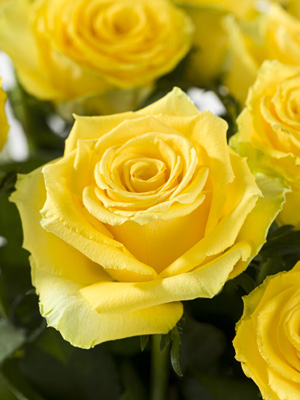

Mexico and Latin America
In Mexico, the yellow rose has a more spiritual meaning. Yellow flowers play a prominent role in the widely celebrated Day of the Dead (Día de los Muertos). The yellow flowers symbolise remembrance, mourning and connection with ancestors. The yellow flowers symbolise the sun and are seen as a guide for souls returning to earth. You will therefore often see yellow flowers in images of this annual commemoration!
The meaning here is therefore very different and less cheerful than in the rest of the world. However, yellow roses can also be given as a gift if you admire someone or have deep feelings for the recipient. This is very different from Western countries, where yellow roses symbolise friendship rather than love.
Symbolism of yellow roses in Latin America:
- Love: Unlike in Western cultures, the yellow rose often symbolises romantic love.
- Admiration: A sign of deep admiration and respect for someone.
- Passion: Used to express fiery and passionate feelings.
- Appreciation: An expression of gratitude for someone's efforts or qualities.
The spiritual meaning of the yellow rose
In spiritual traditions, the colour yellow is often associated with the third chakra (the solar plexus chakra), which represents self-confidence, inner strength and personal growth. In this context, the yellow rose symbolises:
- Enlightenment and wisdom: The colour yellow resonates with the intellect and mental clarity. A yellow rose can symbolise the opening of consciousness.
- Healing of the heart: Yellow roses are sometimes used in energetic and spiritual healing as a flower that brings comfort and joy, especially for emotional wounds.
- Selfless love: Spiritually, the yellow rose represents love without romance – such as the love of a teacher, friend or parent.
- Divine light or presence: In some spiritual traditions, yellow symbolises divine light, and a yellow rose is seen as a messenger of higher energies.
Symbolism of the yellow rose in art
In visual art, the yellow rose is often used to express emotional nuances, depending on the context:
- Joy and vitality: Painters use yellow roses to express energy and zest for life. In still lifes, they often symbolise an optimistic outlook on life.
- Passing happiness: In contrast to wilted flowers, yellow roses can also be depicted as a reminder that joy is temporary.
- Contrast in colour symbolism: In symbolist or surrealist art, yellow roses are sometimes placed opposite red or white roses to explore themes of conflicting emotions (friendship vs. love, joy vs. purity).
For example, in some works by the Pre-Raphaelites or Romantic painters, the yellow rose is used as a subtle reference to unrequited love or pure admiration.
Symbolism of yellow roses in literature


In literary works, yellow roses are often a powerful metaphor, used to represent:
- Innocent or youthful love: Unlike the fiery red rose, the yellow rose in poetry often represents a youthful or playful form of love.
- Deception and jealousy: In Victorian literature, the yellow rose is sometimes associated with envy or a love that is deceitful.
- Loss or remembrance: In modern novels and poetry, yellow roses are used as a symbol of a memory of happier times, or as a flower on a grave, carrying with it the bittersweet memory of joy.
- Inner growth or transformation: In spiritual or philosophical texts, the yellow rose can symbolise a character's inner journey – a kind of ‘blooming self-awareness’.




